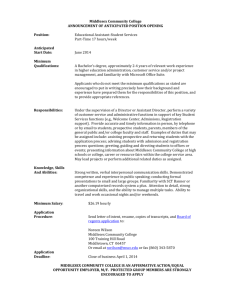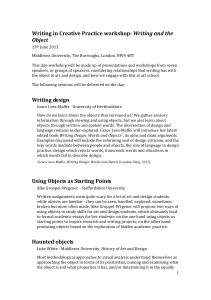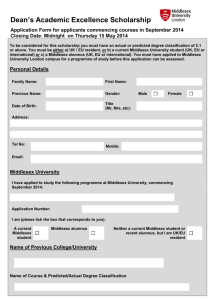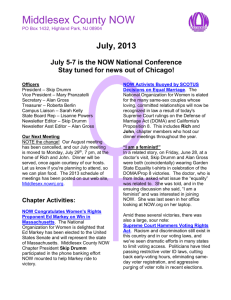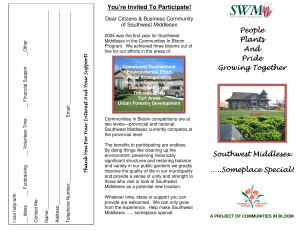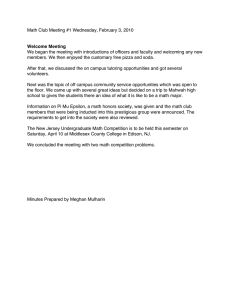REPORT AND RECOMMENDATION APPEAL OF MIDDLESEX CORPORATION REGARDING THE CHIEF ENGINEER’S DECISION
advertisement
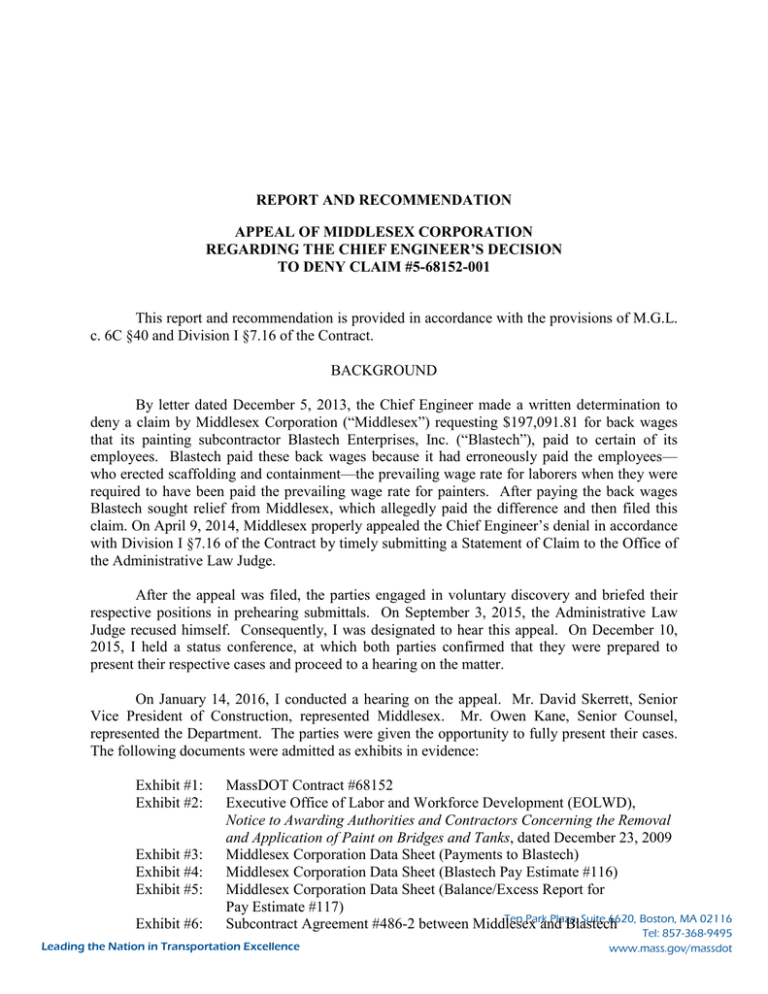
REPORT AND RECOMMENDATION APPEAL OF MIDDLESEX CORPORATION REGARDING THE CHIEF ENGINEER’S DECISION TO DENY CLAIM #5-68152-001 This report and recommendation is provided in accordance with the provisions of M.G.L. c. 6C §40 and Division I §7.16 of the Contract. BACKGROUND By letter dated December 5, 2013, the Chief Engineer made a written determination to deny a claim by Middlesex Corporation (“Middlesex”) requesting $197,091.81 for back wages that its painting subcontractor Blastech Enterprises, Inc. (“Blastech”), paid to certain of its employees. Blastech paid these back wages because it had erroneously paid the employees— who erected scaffolding and containment—the prevailing wage rate for laborers when they were required to have been paid the prevailing wage rate for painters. After paying the back wages Blastech sought relief from Middlesex, which allegedly paid the difference and then filed this claim. On April 9, 2014, Middlesex properly appealed the Chief Engineer’s denial in accordance with Division I §7.16 of the Contract by timely submitting a Statement of Claim to the Office of the Administrative Law Judge. After the appeal was filed, the parties engaged in voluntary discovery and briefed their respective positions in prehearing submittals. On September 3, 2015, the Administrative Law Judge recused himself. Consequently, I was designated to hear this appeal. On December 10, 2015, I held a status conference, at which both parties confirmed that they were prepared to present their respective cases and proceed to a hearing on the matter. On January 14, 2016, I conducted a hearing on the appeal. Mr. David Skerrett, Senior Vice President of Construction, represented Middlesex. Mr. Owen Kane, Senior Counsel, represented the Department. The parties were given the opportunity to fully present their cases. The following documents were admitted as exhibits in evidence: Exhibit #1: Exhibit #2: Exhibit #3: Exhibit #4: Exhibit #5: Exhibit #6: MassDOT Contract #68152 Executive Office of Labor and Workforce Development (EOLWD), Notice to Awarding Authorities and Contractors Concerning the Removal and Application of Paint on Bridges and Tanks, dated December 23, 2009 Middlesex Corporation Data Sheet (Payments to Blastech) Middlesex Corporation Data Sheet (Blastech Pay Estimate #116) Middlesex Corporation Data Sheet (Balance/Excess Report for Pay Estimate #117) Ten Park Plaza, Suite 6620, Boston, MA 02116 Subcontract Agreement #486-2 between Middlesex and Blastech Leading the Nation in Transportation Excellence Tel: 857-368-9495 www.mass.gov/massdot Exhibit #7: Exhibit #8: Middlesex Corporation Data Sheet (Payment Tracking Sheets, Paid to Blastech Enterprises) MassDOT Standard Provisions, Division I, Section 7.01 At the conclusion of the hearing, I took the matter under advisement. FINDINGS I have carefully considered the pre-hearing papers submitted by the parties, and the testimony, exhibits and legal arguments presented at the hearing. I now make the following findings: 1. On April 27, 2011, the Department and Middlesex entered into Contract #68152 (“Contract”) providing for the reconstruction and painting of two steel bridges over the Acushnet River in Fairhaven and New Bedford. Hearing Exhibit #1. 2. The Contract required Middlesex to fully clean and remove the existing paint from the steel bridges and then repaint them. This work is specified in four lump sum pay items for which Middlesex provided the following bid prices: • • • • Item 961.201 - Clean (full removal) & Paint Steel Bridge (West): $1,400,000 Item 961.202 - Clean (full removal) & Paint Steel Bridge (Middle): $1,000,000 Item 961.203 - Clean (full removal) & Paint Steel Bridge (East): $1,750,000 Item 961.204 - Clean (full removal) & Paint Steel Bridge (Hthwy Rd): $ 540,000 3. Middlesex retained Blastech to perform the painting work. The subcontract with Blastech dated June 9, 2011 requires Blastech to perform the work covered by Items 961.201-204, including cleaning and painting the bridges, installing and removing required containment systems and work platforms, blasting and priming, intermediate painting, and finish painting. 4. In its pre-hearing submittal, Middlesex makes the following allegations: a. b. c. d. e. Its subcontractor Blastech made wage payments to certain employees who installed and removed the containment system for the bridge painting work. Statement of Claim, Exhibits 2A, 2B, 2C and 2D. Blastech paid the employees based on the prevailing wage rate applicable to Laborers. It did so in reliance on the Contract language in Special Provisions, Item 101, which states: “The construction of any containment system as required for paint removal shall be paid for under Skilled Laborer.” Statement of Claim, Exhibits 2B, 2C and 2D. In 2013, after a prevailing wage compliance investigation by the Office of the Attorney General, Blastech determined that the employees should have been paid the prevailing wage rate applicable to Painters (Bridges/Tanks). Statement of Claim, Exhibit 2B. Blastech paid back wages and benefits to the employees totaling $197,091.81. Statement of Claim, Exhibit 2B. Because Blastech relied to its detriment on “misleading information” in the Contract, Middlesex on behalf of Blastech is entitled to additional compensation in the amount of the back wages and benefits paid. Statement of Claim, Exhibit 2B. 5. Division I, Subsection 7.01 of the Contract provides: The Contractor shall keep himself fully informed of all state and national laws and municipal ordinances and regulations in any manner affecting those engaged or employed in the work ... The Contractor shall at all times observe and comply with, and shall cause all his/her agents and employees to observe and comply with all existing laws, ordinances, regulations, orders and decrees. 6. The Contract is subject to prevailing wage requirements. Special Provision 00861 is a schedule of prevailing wage rates for various labor classifications, including a rate for “Laborer” and a rate for “Painter (Bridges/Tanks)”. Special Provision 00860 provides: The Contractor’s attention is directed to Massachusetts General Laws. Chapter 149, Sections 25 through 27H, and 150A. This contract is considered to fall within the ambit of that law, which provides that in general, the Prevailing Rate or Total Rate must be paid to employees working on projects funded by the Commonwealth of Massachusetts or any political subdivision including Massachusetts Department of Transportation (MassDOT). 7. Special Provision, Item 101 “Base Labor Rate”, provides: This Item will be used for unanticipated work which is outside the scope of the contract Items, as directed by the Engineer. Under this Item the Contractor shall furnish competent artisans (skilled laborer, painter, carpenter, electrician, etc.) possessing all pertinent licenses and/or certifications, as directed by the Engineer to maintain and repair various components of the bridges to be worked on under this contract … Equipment and tools that are considered part of the artisan’s tool kit are as follows: Skilled laborer: Small hand tools, hand held power tools, and equipment normally used in the trade .… Bridge Painter: Hand scrapers, wire brushes, paint spray apparatus, needle guns, wire wheels, gloves, protective clothing and all power tools common to the trade with power source as necessary to run the equipment. The construction of any containment system as required for paint removal shall be paid for under Skilled Laborer … (emphasis supplied) 8. Prior to bid and award of the Contract, a Notice to Awarding Authorities and Contractors Concerning the removal and Application of Paint on Bridges and Tanks, dated December 23, 2009, was issued by the Executive Office of Labor and Workforce Development. Hearing Exhibit #2. The Notice provided: All awarding authorities and contractors are hereby notified that the Painter (Bridges/Tanks) occupational classification shall be used for the following tasks on public works construction projects covered by the prevailing wage law, Mass.G.L. c.149, §§26 to 27D. …The erection and dismantling of scaffolding, rigging and containment for bridge work and tank painting operations. 9. Blastech did not appear at the hearing and did not offer any proof that it was unaware of the December 23, 2009 Notice from EOWLD, that it detrimentally relied on the Contract language, or that it actually incurred the damages claimed. DISCUSSION This appeal fails for multiple reasons. First and foremost, Middlesex did not meet its burden of proof. The claim that is the subject of this appeal was presented to the Department as a claim on behalf of a subcontractor for $197,091.81 in damages incurred by the subcontractor. As in all cases, the appellant has the affirmative duty to prove fundamental facts relevant to the claim. Yet, no proof was presented at the hearing that Blastech was unaware of the December 23, 2009 Notice from EOWLD, that it detrimentally relied on the Contract language— specifically, the Special Provision, Item 101, or that it actually incurred the damages claimed. Notwithstanding the above, the claim is without merit as a matter of contract. Indeed, we cannot discern how MassDOT is alleged to have breached. It is not alleged that MassDOT failed to pay the amounts due under the contract. Moreoever, the contract, Division I, Subsection 7.01, requires Middlesex and its subcontractors to know the prevailing wage laws. Middlesex confirmed that it was unaware of the 2009 EOWLD Notice and in preparing its bid for this Contract mistakenly assumed that workers installing paint containment systems on this Contract were classified as Laborers for purposes of prevailing wage. In that regard, Middlesex did not meet its obligation “to observe and comply with, and … cause all his/her agents and employees to observe and comply with all existing laws …” To the extent that the claim is one of promissory estoppel, it fails as well. No proof was offered with respect to either Middlesex’s or Blastech’s detrimental reliance on the highlighted statements in the Contract. Blastech did not appear at the hearing and did not offer any proof that it was unaware of the December 23, 2009 Notice from EOWLD, that it detrimentally relied on the Contract language, or that it actually incurred the damages claimed. Middlesex testified that it already believed prior to entering into the Contract that the Laborer’s classification was correct. The testimony was clear that Middlesex did not rely on any statements in the Contract for its understanding. Finally, I note that there was no appropriate proof of the damages claimed. The appeal is from the Chief Engineer’s denial of claim #5-68152-001, requesting $197,091.81 for back wages paid to employees of Blastech, who were originally paid the prevailing wage rate for laborers when they were required to have been paid the prevailing wage rate for painters. There was no proof that Middlesex suffered this damage. Middlesex did not pay the $197,091.81 and did not prove that it did. At the hearing, Middlesex attempted to make a claim for damages that it supposedly incurred separately from Blastech. Middlesex argued that it sustained losses by paying Blastech for work that was not completed and unanticipated costs to follow-on subcontractors. For the reasons discussed above, those costs are not causally related to any breach of duty by the Department. In any event, that claim is entirely outside the scope of this appeal. RECOMMENDATION For the reasons stated above, I recommend that the contractor’s appeal be DENIED. Respectfully submitted, John Englander General Counsel Dated:
